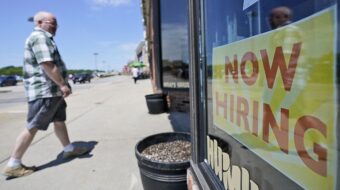It had to happen: Some Republicans are trying to blame the Democrats for the mortgage meltdown, and for the stock exchange crisis that this has triggered, because Democratic politicians have allegedly pushed laws to make it easier for lower income, inner city householders to get mortgages. Also, some are asking what’s the big deal about owning property anyway? Wasn’t it presumptuous and stupid for people who are one paycheck away from poverty to take on mortgage debt they couldn’t afford?
It is true that some people, including President Bush with his “ownership society” nonsense, promote an ideology of property ownership as an indicator of moral worth. Living in inner city Chicago from 1973 to 2004, I saw plenty of occasions in which renters were disparaged as shiftless and dangerous. I even heard property owners yell that people who rent and don’t own should not be allowed to vote in local elections — a throwback to the property qualifications of colonial times.
But the main reasons inner city apartment dwellers want to buy their own houses and move to better neighborhoods are mostly practical. The most frequently voiced concerns are about the safety of their children in gang-infested areas, and the quality of the schools.
There is often a sharp contrast between schools in mostly minority inner city communities and those in surrounding suburbs. A number of factors are involved, but one of the most important is the practice of basing school funding on local property taxes. Valuation of property for tax purposes is generally much higher in well-off suburbs than in older working class cities. So city governments would have to tax their property owners at a much higher rate than governments of wealthy suburbs to get the same income. This situation was eloquently denounced in Jonathan Kozol’s 1991 book “Savage Inequalities.” Unfortunately there has not been substantial improvement since then.
Furthermore, inner city schools are likely to have more expensive special needs than the suburban schools. State and federal grants reduce the funding gap somewhat, but not nearly enough. The truth is that more money needs to be spent on troubled inner city schools than on ones in wealthy suburbs, to overcome the special problems faced by inner city children and their families, but the opposite is the case.
So if you want your kids to go to a better school, you may conclude that you have to go to the suburbs. But if your household income is too low to keep up with mortgage payments, why buy a house you can’t afford? Why not just rent an apartment in the suburbs instead?
In many cases, you can’t. Zoning laws in bedroom suburbs often preclude construction of sufficient quantities of affordable rental housing. This is not accidental; it is deliberately done to “maintain the quality of our community” and to keep “certain kinds of people” out. This is the method of choice for exclusion now that racial covenants and “sundown laws” are illegal. And when lower income working class families try to team up and buy a house collectively, or one member of the family buys a house and several other adult members of the family move in and chip in for the mortgage payments, zoning laws and even fire safety laws are deployed to stop it.
Thus thousands and thousands of families have been desperate to get a mortgage, and the rule of the market has had the result that there have been lenders willing to make shaky or deceptive mortgages. The choice for the families was, or at least seemed to them to be, to take on a risky mortgage, or give up their dreams of a better life for their children.
What would you do, faced with a choice like that?
The net result of the current crisis may be that it becomes even harder for lower paid working class and especially minority families to escape from inner city slums and try to improve the safety and educational opportunities of their children. Cracking down on sleazy mortgage lending practices is essential, but people trying to get out of urban poverty conditions may be collateral damage.
Solving the mortgage crisis requires radical action to solve the affordable housing crisis and the inner city youth and education crisis. This tangle of neglect, inhumanity and cruelty has to be taken on together.
This will not happen without a massive, united struggle involving every kind of labor, community and religious organization. But it also will not happen with “let them eat cake” McCain and his Republican colleagues running the federal, state and local governments. This is another reason to sweep them all out in November.











Comments